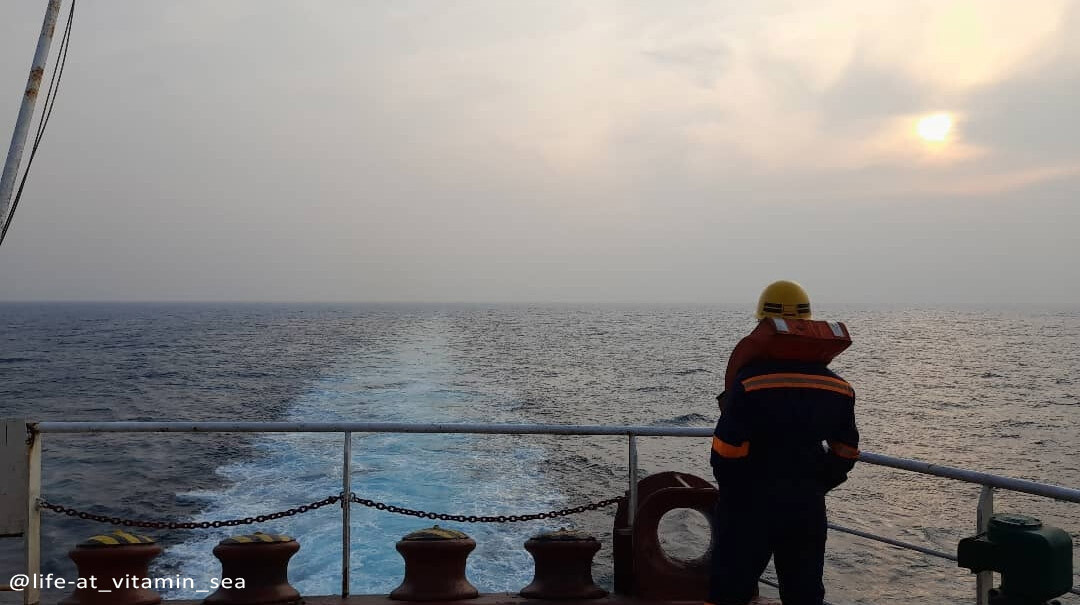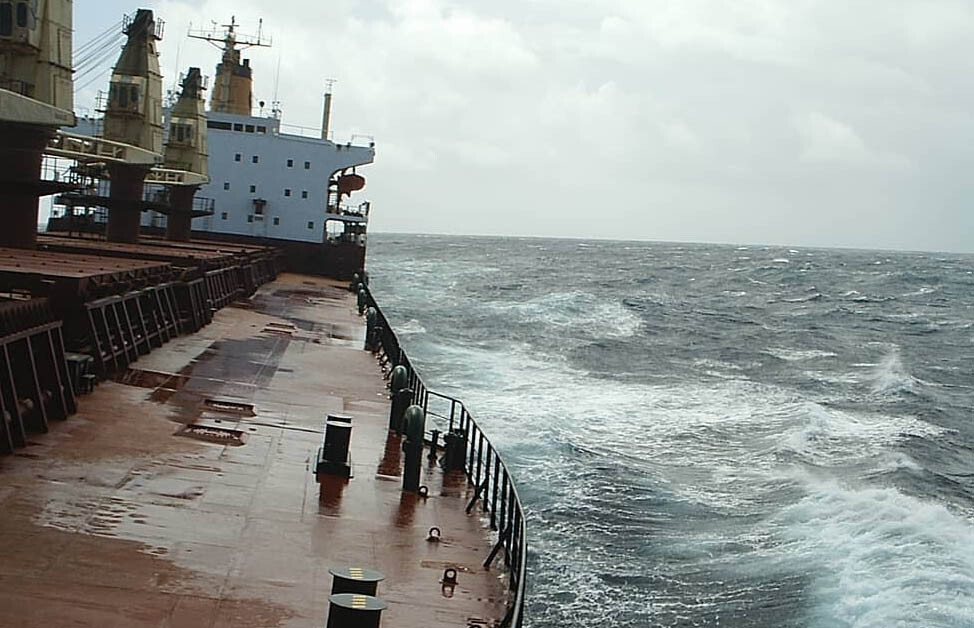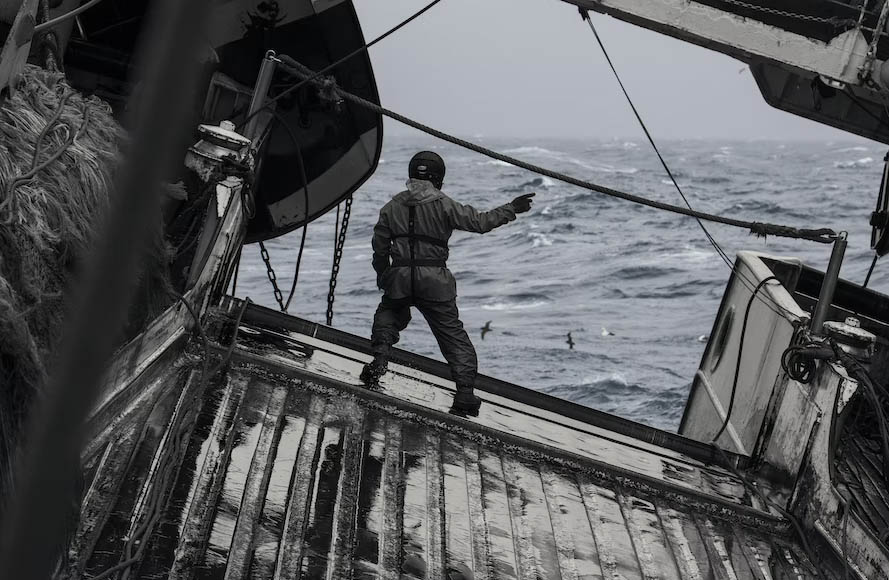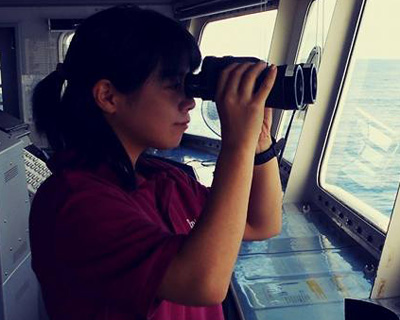I finally cracked the code on how to beat seasickness. But before that, I used to be very, very seasick. I had my fair share of throw-ups due to unforgiving weather that doesn’t seem to stop.
Working through a mild rolling motion with a bucket at my side? Check. Rushing to the bathroom during mealtime in rough weather? Check. Clutching the toilet bowl, fearing I might vomit out my entire stomach? Big check!
My first vessel was an oil/ chemical tanker of 11,000 gross tonnage. Our trading area was around the North Sea, Baltic Sea, and the Bay of Biscay. These are the most unloved sea routes of a lot of seafarers including me especially during winter season.
There is a saying on board that says,
The sea is not always calm and calm seas don’t make good sailors.
I wanted to be a skilled seafarer who knows his stuff even if the weather is bad. In order to do that, I have to beat seasickness so I can be reliable with my job whatever the weather.
What is Sea Sickness?
To be able to give a cure to sea sickness, it is important to know the cause behind it. First, let us understand what it is.
Seasickness is a motion sickness experienced on the water.
During the rocking movement of a vessel, our sense of balance located in our ears is disturbed. Meanwhile, our senses of sight, the eyes, recognize a fixed world or stationary objects.
The brain quickly interprets these contradictory signals and affects our digestion process. You may also recognize that our sense of smell becomes stronger and more sensitive.
For the brain to fix this conflict, it sends an alarm to the whole body to stop all activities. That’s the time we feel sleepy, tired, dizzy, and nauseous.
It’s also quite frustrating to know that during this period, time flies really, really slow.

Should You Sleep it Over?
Because its really tempting to just curl up in bed and wait for the weather to calm down, many want to sleep it over. They want to go straight into bed when the weather starts its turmoil.
I feel them especially after observing my watch crawling all the way to rest periods. It just feels so slow.
But going to bed when you start to get seasick may not always be good if you want to develop tolerance against seasickness.
I usually notice that the more frequently I baby myself into bed, the less resistance I develop against seasickness.
Then I realized, what would happen if for some reasons, the emergency alarm sounds off during rough seas? What if bad situations happen (God forbid) in the middle of bad weather? Will I be able to respond while the ship is rolling to avert an impending disaster?
These thoughts weighed more deeply than my seasickness. Furthermore, it was echoed by one of my Chief Officer who said,
“Listen up! Do you think emergencies only happen during good weather like in training centers? It can strike anytime, anywhere, and on any weather at sea. The most horrific situations occur when the weather turns terrible. So what will happen to you if you’re too seasick even to move?”
With that statement, he refused to let me rest during bad weather, but insisted on sending me to the bridge to work with the third mate and second mate for navigation and lookout duties.
I had no other choice but to practice and develop methods on how to beat seasickness which I eventually did. I’m sharing them all with you here.
Proven Methods to Beat Seasickness
Here are my effective ways on how to beat seasickness. They are mostly based on experience and some of them are advice given from my fellow seafarers.
Try out which one works best for you and stick to it to totally get over seasickness once and for all.
1. Fresh Air
One of the simplest and most effective remedies when dealing with seasickness is to get fresh air.
Go somewhere safe outside the accommodation. Exposure to natural ventilation will blow away your seasick feelings for a while. This is everybody’s favorite when you slowly becomes dizzy or nauseous.
I can still recall an experience when we were doing a wash paint job inside the accommodation. This is one of those “inside job” especially if outside work is not possible. I also did this many times before on fair weather but this time, it was not.
As I dip my rags into the bucket, I recognized a very terrible smell. I immediately ran to the toilet while thinking which would happen first, my arrival in the toilet or my puking.
Good thing it was a tie!
After spewing out my lunch, I peeked outside, went to the bridge, smelt the strong fresh air, and felt a lot better.
Then I remembered what my Captain told me (in an Old Gandalf voice),
“You have to feeeel the elements”.
2. Soft drinks and soda
“You should try drinking soft drinks or soda. It releases the gas out of your stomach and you would feel better,” says one of my crewmate.
So I bought a case of Coca-cola and restrained myself from consuming them before the appointed time. I wanted to test if the legend is true. Then it happened. A massive Force 11 was to be expected within the next 12 hours. I was ready or so.
As soon as I started to feel nauseated and sensed that there was something in my neck ready to burst out, I took a sip of coke. I loved the smell and its sweet taste. I don’t normally fancy sweetened beverages but for now, let’s forget sugar for a while.
I took another sip and made a huge, long burp! (Excuse me). It felt great. I wanted to do it again so I drank and drank and burped for several minutes. It lasted for a while.
But soon, I was running out of gas! My stomach is full. Instead of belching, I found myself throwing up again. It felt really bad but it still tastes sweet.
I learned a lesson this time and not to consume as much soda. The right mix is just enough to release the gas when it starts forming in your stomach.

3. Warm Water
I realized that if my belly feels cold, I warm it up from the inside by drinking warm water. This always make me feel good many times but not during bad weather.
So I gave it a try.
As I take a small sip, the water trickles down my esophagus at a snail’s pace. It feels like a powerful force holding back the urge to vomit while providing a soothing warmth that eases the discomfort in my stomach.
Also, when I put the warm glass on my belly, it even felt better. But as soon as my stomach reached its high level alarm, I found myself again yelling with my best friend- the toilet. I spent my time in there much longer since I had more firepower!
4. Chocolate
I soon thought that since liquid fills me up so easily, I needed to eat something solid and sweet.
“Why not try chocolate,” one guy suggests. “It’s sweet and I tried it many times. For me, it has better effects,” he continued.
My eyes gleamed. I always wanted to eat chocolate in an extra amount but was unable to do so. This time, I have my alibi.
But the problem is, before the bad weather comes, I find myself consuming all of my chocolates. I must confess, eating a whole Firklover is more enjoyable than watching the movie itself.
I managed to save a few and devoured them slowly during bad weather. But still, the call to throw up gets me by surprise. This time, I find it hard because the melted chocolate sticks in my throat. Bad idea. Next.

5. Willpower
This is by far the most effective method I had ever used in dealing with seasickness.
Surprisingly, this is also the most featured advice given to me by my crewmates. I often hear them say, “Masasanay ka rin (You’ll get used to it!).” But when you’re puking your guts out, it’s hard to believe that you could ever survive the whole ordeal.
One time, I decided to mix my willpower with daydreaming.
That is, while the vessel rides the rough sea, I think of some future plans- business, investments, family life, travels, house and lot, and many things seafarers always dreamed up when the weather gets rough. Sometimes, I try to replay my favorite part of a great movie, predict the next episode of anime series or let my imagination about anything run wild.
As long as I can get my mind off the ship, my condition improves. Slowly, my body started to get used to the bad weather.
Some of you might resort to sea sickness pills. I haven’t tried it actually but the thought and smell of it worsen my condition in the first place so I did not dare to. I also avoid eating smelly and sour foods since their smell becomes obnoxious no matter how delicious they used to be.
My best advice to you is not to give up. Because no matter what type of ship you are sailing with, there would come a time that you will literally be at the mercy of the waves.
Focus on things that shift your attention from getting nauseous to being inspired. It might also be helpful to look at your paycheck to motivate you to hold on. Whatever works for you, focus on that and beat seasickness once and for all.
May the winds be in your favor.



0 Comments